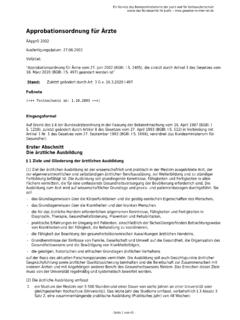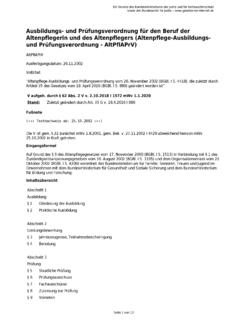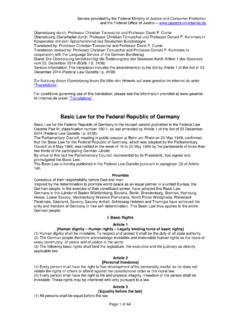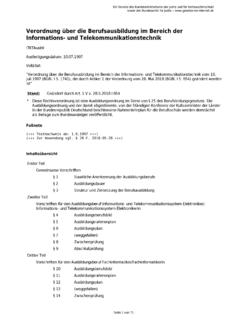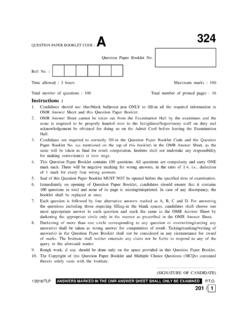Transcription of German Civil Code BGB - Gesetze im Internet
1 Service provided by the Federal Ministry of Justice and Consumer Protection and the Federal Office of Justice Page 1 of 438 bersetzung des B rgerlichen Gesetzbuches durch ein bersetzer-Team des Langenscheidt bersetzungsservice. Laufende Aktualisierung der bersetzung durch Neil Mussett und in seiner Nachfolge durch Samson bersetzungen GmbH, Dr. Carmen v. Sch ning. Translation provided by the Langenscheidt Translation Service. Translation regularly updated by Neil Mussett and most recently by Samson bersetzungen GmbH, Dr. Carmen v. Sch ning. Stand: Die bersetzung ber cksichtigt die nderung(en) des Gesetzes durch Artikel 4 Abs. 5 des Gesetzes vom 1. Oktober 2013 (BGBl. I S. 3719). Version information: The translation includes the amendment(s) to the Act by Article 4 para. 5 of the Act of 1 October 2013 (Federal Law Gazette I p. 3719). Zur Nutzung dieser bersetzung lesen Sie bitte den Hinweis auf unter "Translations".
2 For conditions governing use of this translation, please see the information provided at under "Translations". German Civil code BGB Civil code in the version promulgated on 2 January 2002 (Federal Law Gazette [Bundesgesetzblatt] I page 42, 2909; 2003 I page 738), last amended by Article 4 para. 5 of the Act of 1 October 2013 (Federal Law Gazette I page 3719) This statute serves to transpose into national law the following directives: 1. Council Directive 76/207/EEC of 9 February 1976 on the implementation of the principle of equal treatment for men and women as regards access to employment, vocational training and promotion, and working conditions (OJ L 39 of 14 February 1976, p. 40), 2. Council Directive 77/187/EEC of 14 February 1977 on the approximation of the laws of the Member States relating to the safeguarding of employees rights in the event of transfers of undertakings, businesses or parts of businesses (OJ L 61 of 5 March 1977, p.)
3 26), 3. Council Directive 85/577/EEC of 20 December 1985 to protect the consumer in respect of contracts negotiated away from business premises (OJ L 372 of 31 December 1985, p. 31), 4. Council Directive 87/102/EEC for the approximation of the laws, regulations and administrative provisions of the Member States concerning consumer credit (OJ L 42 of 12 February 1987, p. 48, last amended by Directive 98/7/EC of the European Parliament and of the Council of 16 February 1998 amending Directive 87/102/EEC for the approximation of the laws, regulations and administrative provisions of the Member States concerning consumer credit (OJ L 101 of 1 April 1998, p. 17), 5. Council Directive 90/314/EEC of 13 June 1990 on package travel, package holidays and package tours (OJ L 158 of 23 June 1990, p. 59), 6. Council Directive 93/13/EEC of 5 April 1993 on unfair terms in consumer contracts (OJ L 95 of 21 April 1993, p.)
4 29), Service provided by the Federal Ministry of Justice and Consumer Protection and the Federal Office of Justice Page 2 of 438 7. Directive 94/47/EC of the European Parliament and of the Council of 26 October 1994 on the protection of purchasers in respect of certain aspects of contracts relating to the purchase of the right to use immovable properties on a timeshare basis (OJ L 280 of 29 October 1994, p. 82), 8. Directive 97/5/EC of the European Parliament and of the Council of 27 January 1997 on cross-border credit transfers (OJ L 43 of 14 February 1997, p. 25), 9. Directive 97/7/EC of the European Parliament and of the Council of 20 May 1997 on the protection of consumers in respect of distance contracts (OJ L 144 of 4 June 1997, p. 19), 10. Articles 3 to 5 of Directive 98/26/EC of the European Parliament and of the Council of 19 May 1998 on settlement finality in payment and securities settlement systems (OJ L 166 of 11 June 1998, p.
5 45), 11. Directive 1999/44/EC of the European Parliament and of the Council of 25 May 1999 on certain aspects of the sale of consumer goods and associated guarantees (OJ L 171 of 7 July 1999, p. 12), 12. Articles 10, 11 and 18 of Directive 2000/31/EC of the European Parliament and of the Council of 8 June 2000 on certain legal aspects of information society services, in particular electronic commerce, in the Internal Market ( Directive on electronic commerce OJ L 178 of 17 July 2000, p. 1), 13. Directive 2000/35/EC of the European Parliament and of the Council of 29 June 2000 on combating late payment in commercial transactions (OJ L 200 of 8 August 2000, p. 35). Book 1 General Part Division 1 Persons Title 1 Natural persons, consumers, entrepreneurs Section 1 Beginning of legal capacity The legal capacity of a human being begins on the completion of birth.
6 Section 2 Beginning of majority Majority begins at the age of eighteen. Sections 3 6 (repealed) Section 7 Residence; establishment and termination (1) A person who settles permanently in a place establishes his residence in that place. (2) There may be a residence in more than one place at the same time. (3) Residence is terminated if the person abandons the place of residence with the intention of giving it up. Section 8 Residence of persons who lack full capacity to contract Service provided by the Federal Ministry of Justice and Consumer Protection and the Federal Office of Justice Page 3 of 438 (1) A person who is not capable of contracting or who has limited capacity to contract can neither establish nor terminate residence without the consent of his legal representative. (2) A minor who is or has been married may independently establish and terminate residence.
7 Section 9 Residence of a soldier (1) A soldier has his residence in his garrison. The residence of a soldier who has no garrison within the country is deemed to be his last garrison within the country. (2) These provisions do not apply to soldiers who are merely doing compulsory military service or who cannot independently establish residence. Section 10 (repealed) Section 11 Residence of a child A minor child shares the residence of its parents; it does not share the residence of a parent who lacks the right to care for the person of the child. If neither parent has the right to care for the person of the child, the child shares the residence of the person who has this right. The child retains the residence until it validly abandons it. Section 12 Right to a name If the right of a person to use a name is disputed by another person, or if the interest of the person entitled to the name is injured by the unauthorised use of the same name by another person, the person entitled may require the other to remove the infringement.
8 If further infringements are to be feared, the person entitled may seek a prohibitory injunction. Section 13 Consumer*) A consumer means every natural person who enters into a legal transaction for purposes that predominantly are outside his trade, business or profession. *) Official note: These provisions serve to implement the directives set out above under numbers 3, 4, 6, 7, 9 and 11. Section 14 Entrepreneur*) (1) An entrepreneur means a natural or legal person or a partnership with legal personality who or which, when entering into a legal transaction, acts in exercise of his or its trade, business or profession. (2) A partnership with legal personality is a partnership that has the capacity to acquire rights and to incur liabilities. *) Official note: These provisions serve to implement the directives set out above under numbers 3, 4, 6, 7, 9 and 11.
9 Sections 15 - 20 (repealed) Title 2 Legal persons Subtitle 1 Associations Chapter 1 General provisions Section 21 Non-commercial association Service provided by the Federal Ministry of Justice and Consumer Protection and the Federal Office of Justice Page 4 of 438 An association whose object is not commercial business operations acquires legal personality by entry in the register of associations of the competent local court [Amtsgericht]. Section 22 Commercial association An association whose object is commercial business operations acquires legal personality, for lack of special provisions under federal law, by state grant. The grant is in the power of the Land in whose territory the association has its seat. Section 23 (repealed) Section 24 Seat The seat of an association, unless otherwise provided, is the place where the management is conducted.
10 Section 25 Constitution The constitution of an association with legal personality is, to the extent that it is not based on the following provisions, determined by the articles of association. Section 26 Board and representation (1) An association must have a board. The board represents the association in court and out of court; it has the status of a legal representative. The extent of the power of agency may be restricted by the articles of association with effect against third parties. (2) If the board consists of several persons, the association is represented by the majority of the board members. If a declaration of intent is to be submitted to an association, it is sufficient to submit it to one member of the board. Section 27 Appointment of and management by the board (1) The appointment of the board is by resolution of the general meeting.
